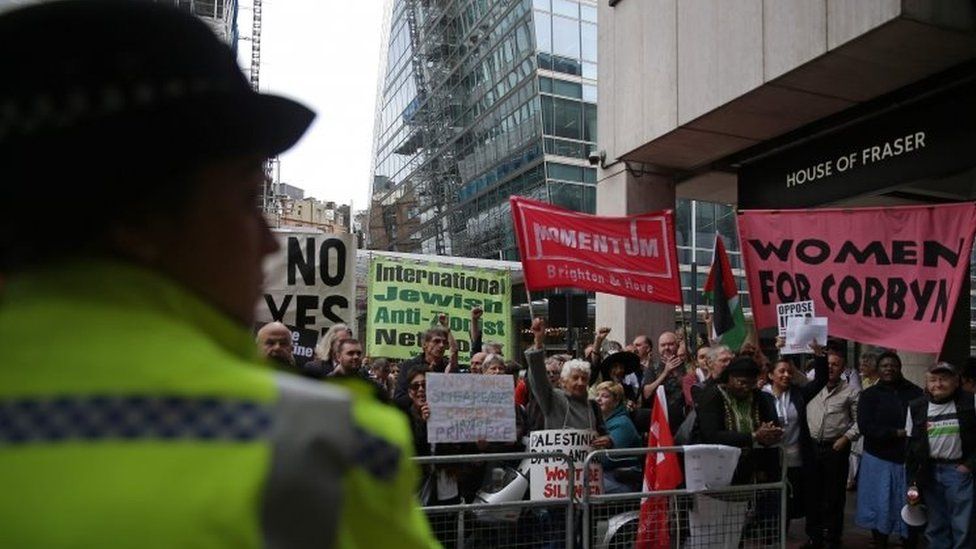Labour adopts full anti-Semitism definition
- Published

The UK Labour Party's ruling body has agreed to adopt in full an international definition of anti-Semitism, after months of rows.
It will incorporate all the 11 examples of anti-Semitism cited by the International Holocaust Remembrance Alliance into its code of conduct.
But Jewish groups have attacked an accompanying statement agreed by the NEC aimed at protecting free speech.
One warned it risked giving "racists a get-out-of-jail card".
After a three hour meeting in London, Labour said its National Executive Committee had adopted all of the IHRA examples of anti-Semitism, including four it left out in July, alongside a statement ensuring "this will not in any way undermine freedom of expression on Israel or the rights of Palestinians".
The party, which has struggled to contain a long-running row over claims of anti-Semitism within its ranks, said it "welcomed Jeremy Corbyn's statement to the meeting about action against anti-Semitism, solidarity with the Jewish community and protection of Palestinian rights".
Shadow business secretary Rebecca Long-Bailey said the NEC decision was a "clear indication of our direction of travel" and Labour would now hold a consultation on changing the wording of its code of conduct.
She said the party needed "a comprehensive and legally robust document" with which to implement action against our members who might breach the IHRA examples and definition.
"We need to have a code in place and what we want to do now is re-invite those organisations that we have sought to work with over the last year or so and get their views and really make that code watertight so that it's crystal clear to all of our members what is acceptable and what isn't."
Way out of the mess?
By the BBC's political editor Laura Kuenssberg
Perhaps this marks the beginning of the end of this sorry mess. But what makes an early resolution tricky is the caveat that Labour has included alongside.
It will be important to many of Mr Corbyn's supporters who want the right to criticise Israel.
But for those campaigning against anti-Semitism, it still sends a message that Labour might want to make exceptions, that the party is saying "yes, but", rather than "yes, of course", to loud demands from the Jewish community that they take the strongest action possible against those who would foment tension.
Rival protesters gathered outside Labour's headquarters as its senior officials discussed the issue.
Some activists wrapped in Israeli flags condemned Labour as being "for the many, not the Jew" while others urged the NEC to resist calls to adopt the IHRA definition, one carrying a banner stating "criticism of Israel is not anti-Semitism".
'Disappointed'
As well as urging the party to adopt the IHRA definition in full with all examples, Mr Corbyn set out some of the concerns Labour members had raised about limitations on freedom of speech in his comments at the NEC meeting.
The BBC's political editor Laura Kuenssberg said she understood the Labour leader suggested a more extensive accompanying statement stating that "it should not be considered anti-Semitic to describe Israel, its policies or the circumstances around its foundation as racist because of their discriminatory impact, or to support another settlement of the Israel-Palestine conflict" but that this was rejected.
The BBC's political correspondent Iain Watson said this followed a split among left-wing members of the NEC, with Momentum founder Jon Lansman and a Jewish colleague Rhea Wolfson making it clear they did not support their leader's position.
The Jewish Leadership Council criticised Mr Corbyn's actions and said the free speech caveats would "drive a coach and horses" through the anti-Semitism definition.
"It is clearly more important to the Labour leader to protect the free speech of those who hate Israel than it is to protect the Jewish community from the real threats that it faces," its chief executive Simon Johnson said.
'Get out of jail card'
Campaign group Labour Against anti-Semitism said it was disappointed by "the attachment of a "clarification" that risks giving racists in the party a get-out-of-jail card".
And the Board of Deputies of British Jews said "firm action" was now needed against anti-Semites in the party and Mr Corbyn should apologise for "past anti-Semitic comments and affiliations".
There was a mixed response from MPs who have been critical of the leadership over what they say is its failure to get to grips with the problem.
Allow Twitter content?
This article contains content provided by Twitter. We ask for your permission before anything is loaded, as they may be using cookies and other technologies. You may want to read Twitter’s cookie policy, external and privacy policy, external before accepting. To view this content choose ‘accept and continue’.
Allow Twitter content?
This article contains content provided by Twitter. We ask for your permission before anything is loaded, as they may be using cookies and other technologies. You may want to read Twitter’s cookie policy, external and privacy policy, external before accepting. To view this content choose ‘accept and continue’.
Supporters of Mr Corbyn had argued that adopting the IHRA definition with all examples would restrict freedom to criticise Israel's actions against Palestinians.
Labour MP Chris Williamson, an ally of Mr Corbyn, said Jewish opinion was not "homogenous" when it came to backing the definition and the party's decision to adopt it was a "pragmatic" one.
"I don't think Jeremy was isolated in any way, shape or form," he told the BBC.
"He set out the position and said it was important, in view of the pressure, the party needed to adopt all the examples not withstanding the criticisms by the original author of them."
He said the development would not prevent Labour activists from criticising the actions of the "apartheid" Israeli government led by Benjamin Netanyahu and he urged the "small element obsessed with the issue" of anti-Semitism within the party to now get behind their leader.